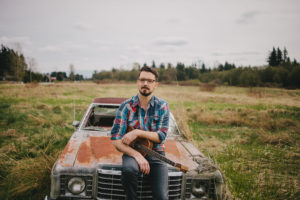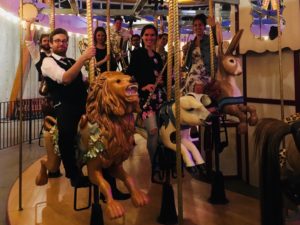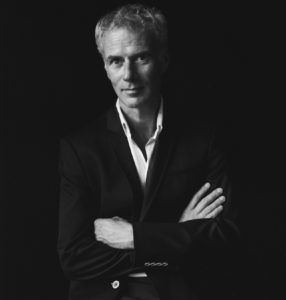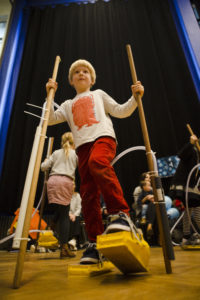Twenty-five years ago, Wouter Van Looy was a violinist involved in theatrical productions in his native Belgium when he had a eureka moment.
The result is a festival called Big Bang.
“At that time I was a musician working in the theatre. I was going to a lot of adult concerts and having discovered the beautiful world of children’s theatre, I missed something.
“I missed really good concerts that shared the richness of music with young audiences.”
Van Looy is from Belgium. He is an opera and musical theatre creator in his home nation and across Europe. At present, he is director-in-residence and co-artistic director at Muziektheater Transparant, a Flemish company based in Antwerp.

James Hill is a wizard of the ukelele.
He is also the founder of Big Bang which is a music festival for a young audience that operates in 14 European cities and, since 2019, in Ottawa at the National Arts Centre. The Big Bang Festival here takes place on Feb. 16 and 17.
In 1995, he said, there were educational programs with orchestras and classical musicians explaining composers such as Mozart and Beethoven and what a violin is and how many strings it has. “But I had the feeling much more was possible.”
His experience told him that children’s theatre has “a very rich and strong theatrical language that is used to engage children. I was looking for ways to do something similar and open the door to music in all its aspects from improvised music to contemporary classical, indie rock, sound installation and so on.”
The result was a festival originally called rather cheekily Oorsmeer, which is Dutch for ear wax.
“Many things have changed over the years but the mission is still there,” he said.

Oktopus is a Quebec-based eight piece ensemble dedicated to bringing Eastern European music to audiences of all ages.
After he started getting invitations to set up festivals elsewhere, he decided to change the name of the festival to Big Bang. Out of that has grown a network of festivals that connects organizers in Europe who exchange information and c0-produce projects and present a version of the festival in their venues.
“We aren’t alone anymore. We have many partners. By now I think the Big Bang Festival is the largest art event for children worldwide.”
He now sees people coming to the festival who attended as a child in 1995.
“They are coming back with their children today.
As music and art education is disappearing from schools on the sides of the Atlantic Ocean, the Big Bang’s position is perhaps even more significant.
“I feel there is a big insecurity in the schools. They want to know how to teach the arts or how to share music.” They appear to have lost the ability to do this, he said. So every Big Bang festival sets aside a day for schools.
Big Bang’s emphasis is on providing experiences that, as much as possible, involve the audience.
“When there is a very strong involvement from the audience we think that the project is doing well.
“There are many ways to stimulate this involvement and one of these things is play. We all discover by playing. It is always a mix of seeing things, discovering things and listening to things and at the same time getting the opportunity to do things yourself.
“We call this the impression-expression cycle. I try to integrate this as a natural cycle within the festival so that children aren’t only invited to sit down and listen to adults, they are invited to participate and get actively involved in the music.”
An example of this can be found in one of the events in this weekend’s gathering.
It’s called The Listening Room.
In Ottawa, the show is a collaboration between the NAC Orchestra and the NAC’s Theatre français, said Kelly Racicot, an education officer with the NAC. This show is all about the music of Mozart.

Wouter Van Looy. Photo: Mirjam Devriendt
The performances on Feb. 16 and 17 will be led by NACO’s Alexander Shelley. The action will be directed by Maxime Genois, lighting designer Hugo Dalphond and set designer Camille Barrantes.
Two young actors of different ages will play a nameless child who discovers the listening room and subsequently the orchestra. The child will appear to grow older as the show progresses.
The event begins in near darkness in a small listening room, Racicot wrote with some ethereal music playing. Lights rise on a child on a scaffold on one side of the stage. Then NACO’s wind quintet steps forward to play Mozart’s Overture to The Magic Flute. Halfway through the piece, the entire orchestra appears and plays the rest of the overture.
In the show two or three children from the audience will be invited to “conduct” the orchestra holding a “light cube” that Shelley will demonstrate.
There will be musicians wandering about the audience and the child actor will move through the seated musicians.
Much of the event will be caught on camera and shown on a large screen.
The NAC also promises interactive musical installations and activities before and after the show.
Van Looy says The Listening Room events are ways to experiment with new forms of presenting a concert with both children and adults in the concert hall.
Many of his partners in Europe also have orchestras in residency offering many opportunities for co-productions.
In the first Listening Room, Van Looy used the music of John Cage.
He said the enigmatic American composer’s work is actually perfect to engage children.
“He is like a kid. He draws music from everywhere. Every sound can be a musical sound. A car passing by can be music. His experimental open approach is very playful and adventurous. It brings music back to the children’s level.

StepStrument allows kids to make music by stomping around a special space.
At present the Big Bang collaboration with the NAC will last through 2021, so expect another event next February.
In his work as an opera and musical theatre director, Van Looy says he is learning from many art forms including his work with the festival.
“One of the goals for Big Bang is that the festival and the projects we do should be on the same level as the work we create and present for adults. We see them as equals in fact.
“Sometimes people say we are doing this for children because they are the audience of the future. This is wrong. We take them very seriously and try to give them the best artists and the best performances at highest quality.
“When I work for young audiences there is a freedom connected to the things you can do, which is inspiring when I go back to the stage for adults.
The Big Bang Ottawa begins Feb 16. noon to 5:30 p.m.; Feb. 17, 10 a.m. to 5 p.m. (The NAC says some programming will open to the public on Feb. 15.) For a full list of events, many of which are free, please see nac-cna.ca.







